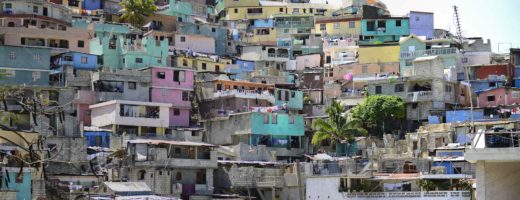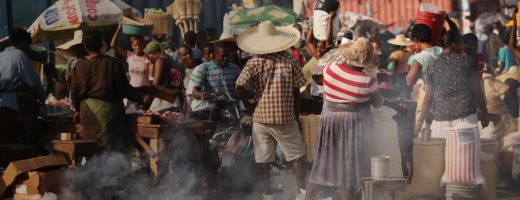As LGBT community becomes more visible, anti-gay violence rises, too. By Allyn Gaestel for Al Jazeera America November 8, 2014 Source: http://projects.aljazeera.com/2014/haiti-lgbt/ (Note: see original story for more photos) Port-au-Prince, Haiti The courtyard, tucked off a quiet road here and ringed by mango trees heavy with immature green fruit, was bedecked with a rainbow
Homosexuality is legal in Haiti, however homosexuals often face persecution and discrimination similar to most of Latin America and the Caribbean. Although homosexuality is technically legal, there are no laws in Haiti protecting LGBT people from these types of mistreatment. There is no recognition of same-sex marriage, and the topic has not surfaced in serious political discussion at the national level. The major presence of AIDS/HIV, the prevalence of poverty in, and the political and social influence wielded by the Roman Catholic Church in the Haitian population is a major factor to take into account for the LGBT minority in the country. There is no obvious or outstanding LGBT life in the country. The LGBT minority, as a result of income disparities in the country, is divided between the rich gays, lesbians and bisexuals (often in positions as NGO and UN aid workers, businesspeople, artisans, and government officials, usually consisting of whites and mulattoes) who live in such areas as Petionville (where they are a minority) and the urban poor LGBTs who live in the most desperately-poor areas of the country. They are also in the closet most of the time, although the only area that accepts an LGBT identity without discrimination is the voodoo ceremony; Voodoo, as a spirituality, possesses very little discrimination against gays, and gay participants in voodoo ceremonies are common.

Gay Haiti
Intro: Probably the most immediate and visual source of knowledge about the LGBT life in Haiti is the 2001 film ‘Of Men and Gods’ which documents the discreet world of gays and transvestites in this country where homosexuality is legal but not tolerated by the mostly Christian culture. Eighty percent of the country is Catholic and another fifteen percent are Protestant; needless to say, the Biblical curse is heavily upon gays here. Yet more than half the population also indulge in voodoo beliefs and rituals where it’s the spirit that matters, not the gender or orientation.
During the reign of the Duvalier dictators (1957-86), as well as today, Haitian gay citizens are forced to walk a shadowy line between revealing themselves to a select few friends and living discreetly in the larger disapproving heterosexual society.
Posted here are four stories about life in Haiti from different perspectives: (1) my own story based on a visit to Haiti , (2) a gay Haitian-American man’s testimony, (3) a commentary about gays and voudou, and (4) an article about Haiti’s economic conditions.
The Taxis in Haiti’s Port au Prince
By Richard Ammon March 2003 Updated July 2006 Also see: Gay Haiti Stories Gay Haiti News & Reports 2002 to present Gay Haiti Photo Galleries A couple of years ago I took several taxi rides in various Japanese cities. The cars were newer models–virtually all white Toyotas–spotless inside and out; the seat backs had doilies


